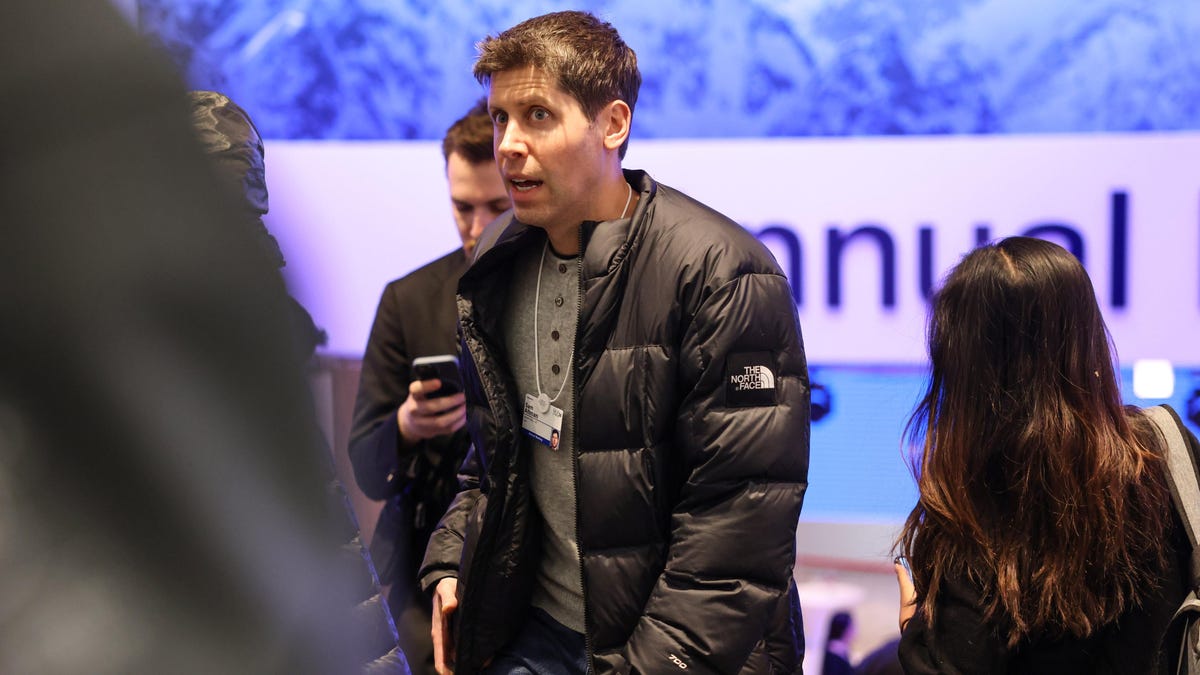Sam Altman, the Jimmy Neutron-looking OpenAI CEO, had a lot to say at this year’s World Economic Forum (WEF) in Davos, Switzerland. During an interview, Altman implied that his industry should lean into nuclear power to keep up with its growing energy footprint. That’s not exactly a surprising turn of events, but it does underline a growing refrain from Silicon Valley: AI is simply going to need more power if it’s going to take over the world.
It makes sense that this would be a topic of conversation at Davos. Every year, the world’s richest douchebags get together at the much-hyped WEF event, where they amicably argue with one another over the best path forward for global capitalism. The event is designed to give participants—which are mainly billionaires, business leaders, and lobbyists—the ability to “game out” specific initiatives for how to make money more efficiently. It only makes sense that the sustainability of the AI industry, which has spawned ungodly amounts of financial investment over the past year, would be a central focus at this year’s conference.
Altman had plenty to say about the future of his industry, notably claiming that AI needs some sort of axis-shifting, Copernican “breakthrough” when it comes to energy innovation.
“There’s no way to get there without a breakthrough,” Altman said, during an interview, as reported by Reuters Tuesday. “It motivates us to go invest more in fusion.”
It’s no secret that the AI industry requires a breathtaking amount of power. Indeed, the ecological impacts of this business are enough to make most seriously-minded environmentalists run screaming for the hills. In recent months, tech companies have been casting about for alternative power sources that will be more environmentally friendly and, more importantly, will provide ever greater amounts of energy to satisfy the data-sucking ways of AI. Altman, himself, has thrown hundreds of millions of dollars at energy fusion projects—including Helion Energy, a fusion startup that is now owned by OpenAI’s special business partner Microsoft.
There are a lot of experts who contend that nuclear power if handled correctly, could be a good thing for America. That said, whether the best use of that nuclear power would be creating faster chatbots and content generators is an entirely different question.
Here are some other things we learned from Altman at Davos:
- The OpenAI CEO isn’t too worried about the impact his technology will have on the 2024 U.S. Presidential election. Experts contend that the impact AI-fueled disinformation could have on the upcoming Presidential election is quite large but Sam doesn’t seem to see it that way. During an interview with Bloomberg, Altman said that he wasn’t particularly worried about the impact AI would have on voters. “I believe that America is going to be fine no matter what happens in this election. I believe that AI is going to be fine no matter what happens after this election,” Altman offered, optimistically. OpenAI recently released new guidelines that put limits on how its products can be used in politics.
- According to Sam, we shouldn’t be too worried about AI stealing our jobs. Altman appeared to tamp down concerns about AI’s job-stealing capabilities at a speaking event that featured him and Microsoft CEO Satya Nadella. “People will go on with their lives,” he said. “We are making a tool that is impressive, but humans are going to do their human things.” He added: “We always find new things to do, and yet it does seem somewhat different if AI can, like, have more cognitive power than any of us,” he said. “We have no idea what happens next.”
- Altman is nonplussed with the fact that the New York Times is suing OpenAI. Axios reported that Altman said his company doesn’t need the kinds of training data that might be provided by big media publishers like the New York Times. The newspaper is currently suing OpenAI for copyright infringement.
In short: According to Sam, everything is fine, AI is great, and everybody should just relax and learn to love the automation revolution. While I don’t believe most of that for a second, it’s about what you’d expect from a guy tasked with selling AI software.


